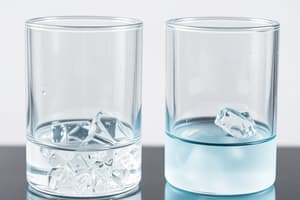Podcast
Questions and Answers
Bose-Einstein condensates are a state of matter that can be achieved at room temperature.
Bose-Einstein condensates are a state of matter that can be achieved at room temperature.
False
The density of a substance is its mass per unit area.
The density of a substance is its mass per unit area.
False
The color of a substance is due to the emission of light by its particles.
The color of a substance is due to the emission of light by its particles.
False
Water is a typical example of matter in the solid state.
Water is a typical example of matter in the solid state.
Signup and view all the answers
Viscosity is the measure of a substance's ability to conduct heat.
Viscosity is the measure of a substance's ability to conduct heat.
Signup and view all the answers
Understanding the physical properties of matter is important for designing materials for specific purposes.
Understanding the physical properties of matter is important for designing materials for specific purposes.
Signup and view all the answers
Matter in the solid state can be easily poured and spilled.
Matter in the solid state can be easily poured and spilled.
Signup and view all the answers
Gases expand to fill the container they are in.
Gases expand to fill the container they are in.
Signup and view all the answers
Plasmas are typically observed in the solid state of matter.
Plasmas are typically observed in the solid state of matter.
Signup and view all the answers
Carbon dioxide is a gas at room temperature.
Carbon dioxide is a gas at room temperature.
Signup and view all the answers
Study Notes
Matter: States and Physical Properties
Matter is anything that has mass and occupies space. It exists in various states, or phases, that exhibit different physical properties. The most common states of matter are solid, liquid, and gas, while plasma and Bose-Einstein condensates are less common due to the extreme temperatures and pressures required to achieve these states.
Solid State
In the solid state, the particles making up the matter are closely packed together. The vibrational motion of the particles is limited, and the matter keeps its shape regardless of the container it is in. Examples of matter in the solid state include ice, metals, and solidified gases like carbon dioxide.
Liquid State
In the liquid state, the particles are not as closely packed together compared to the solid state. They have more freedom to move and interact with each other, causing the matter to take on the shape of its container. Liquids can be easily poured and spilled. Examples of matter in the liquid state include water, mercury, and oils.
Gas State
In the gas state, the particles are widely dispersed and move randomly. Gases expand to fill the container they are in and can be compressed. Examples of matter in the gas state include air, nitrogen, and oxygen.
Plasma State
Plasmas form when a gas is heated to such an extent that the electrons escape from the atoms and move freely. Plasmas are ionized gases and are observed in stars, lightning, and some industrial processes.
Bose-Einstein Condensates
Bose-Einstein condensates are a state of matter that can only be achieved at extremely low temperatures. They are created when a gas of bosons (a type of particle) cools to a temperature where their quantum states merge into a single quantum state.
Physical Properties
The physical properties of matter are the observable characteristics that describe the matter, such as its appearance, texture, and behavior. These properties include:
- Density: The mass of a substance per unit volume.
- Color: The color of a substance is due to the absorption and reflection of light by its particles.
- Melting and Boiling Points: The temperatures at which a substance changes its state from solid to liquid (melting point) and liquid to gas (boiling point).
- Heat Conductivity: The ability of a substance to transfer heat.
- Electrical Conductivity: The ability of a substance to conduct an electric current.
- Magnetic Properties: The interaction of a substance with magnetic fields.
- Viscosity: The resistance of a substance to flow.
Understanding the states and physical properties of matter is crucial for various applications, from designing materials for specific purposes to predicting the behavior of substances in different environments.
Studying That Suits You
Use AI to generate personalized quizzes and flashcards to suit your learning preferences.
Description
Learn about the different states of matter, including solid, liquid, gas, plasma, and Bose-Einstein condensates, as well as their physical properties such as density, color, melting and boiling points, and more. Understand how matter behaves in different environments and its applications in various fields.




